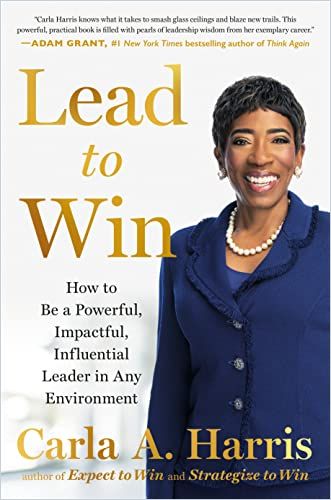Author, speaker, investment banker – and gospel singer – Carla A. Harris details what skills today’s leaders must develop, now and in the future.

Build Your Skills
Best-selling author, speaker, investment banker – and gospel singer – Carla A. Harris, former chair of the National Women’s Business Council, details the vital skills superior leaders need. Harris explains that leaders must adjust and adapt while embracing that the only certainty is uncertainty.
Fear and Threats
In decades past, many CEOs controlled employees through fear. They demoted or fired anyone who showed independence. These CEOs were not innovative. They did not focus on customers.
Their time, Harris makes plain, has passed.
Both the pandemic and the social unrest have created air cover for leaders who want to transform or pivot their cultures without the typically associated risk of retribution.Carla A. Harris
Today, executives value pleasing customers, innovating and offering superior service at the lowest possible prices. Executives of effective companies go to great lengths to please their customers.
Companies must retain top talent, particularly the managers who lead teams. Firms must recruit promising new employees. To compete, they must offer generous compensation programs. And, they must pay quality managers well. These leaders motivate and inspire their teams and build loyalty and engagement among their employees.
These leaders are authentic, energetic and tough-minded risk-takers and visionaries. Their employees admire and trust them and don’t want to leave.
Crucial Steps
As aspiring leaders capably handle assignments from their superiors, they also make sure their people have the resources, experiences and opportunities to handle their tasks.
These leaders heed the interests of the firm’s core stakeholders and other essential constituencies. Consider how you want others to perceive you as a leader. What must you do to succeed with your current leadership opportunities? What do your superiors expect of you? How do you want the people on your team to describe you? What must you accomplish within the next three years?
Collaborating with your people and encouraging their best efforts shows you respect and recognize their capabilities and talents.
Recruiting, interviewing and hiring quality people is an art, not a science. When you must fill a position that requires a high level of technical expertise, talk to professionals in your organization who possess that knowledge. Heed their advice about job applicants.
Taking the risk, even when it doesn’t work out the way you wanted, always brings you the gift of experience, and experience is extremely valuable.Carla A. Harris
The best corporate leaders don’t fear risk because they believe in themselves and their ability to analyze, think strategically, figure things out and fix problems. These leaders trust their data and their ability to interpret data accurately. They gamble intelligently, with solid information, to cut risk as much as possible.
Bold innovation by cutting-edge firms that work independently is still a manifestation of success. However, many of today’s most creative companies also want to form partnerships to achieve innovation. The reason is simple: Financial issues and other pressures make it difficult for most companies to carry out timely innovation entirely by themselves.
Working closely with other firms allows companies to share innovation costs and benefit from their partners’ special competencies. Partnerships in your sector may protect both you and your partner from outside competition.
Many leaders distinguish themselves not only by their solo feats and individual skills, but by their ability to organize and employ talented teams.But never assume that quality leadership is accidental. The best leaders are purposeful in all they say and do. Their actions are intentional – often, even predictable.
Change Agents
Transformational times call for transformational leaders, farsighted change agents who reshape their companies for the future. Effective change efforts affect an organization’s culture, platforms, supply and distribution systems, recruitment and hiring processes, and its public profile.
The game-changing, work-from-home dynamic that emerged during the COVID-19 pandemic calls on transformational leaders to establish efficient work arrangements that suit a majority of their employees.
Leaders must prepare to handle crises, from stock market drops to natural disasters, as well as unthinkable tragedies like the September 11, 2001 terrorist attacks. Capable leaders must provide stability in hard times by taking over, maintaining calm and reassuring their employees.
Leaders typically must get comfortable and confident making decisions with incomplete and imprecise information and without having clear visibility on the myriad potential outcomes.Carla A. Harris
This section reveals the conventional and comfortable nature of Harris’s advice. What she advocates and details appears in most leadership books these days. Given Harris’s extraordinary résumé, you may be surprised how familiar most of her advice sounds, though it’s solid, and she delivers it with straightforward conviction.
Human beings have deficits and blind spots. Your blind spots, Harris warns, can interfere with your ability to lead effectively. Many business leaders can spot and hire good talent, but just as many don’t know how to recruit talented people or make the most of their talent once they’re onboard. Too many leaders keep ineffective staffers on their teams for too long. An inability to create viable succession plans means many leaders fail to prepare successors on their teams or in their firms, so no one is ready to replace them when they move to new opportunities. Being blind about how to innovate impedes many leaders from imagining doing anything different from their existing norm. Blind leaders can’t see the opportunities the future holds.
Insight, Not Oversight
Old-time business leaders focused on having oversight and on monitoring their employees for obedience and compliance. Enlightened, modern leaders focus on insight, not oversight.
Harris believes that future leaders must be able to envision how – with proper training and development – they can groom their people to move into more responsible positions. Insightful leaders create strategies and plans for delivering results, now and in the future.
Familiar
Carla A. Harris writes in an easy, familiar, maternal and conversational voice. Her voice suits her material, which, while not groundbreaking, is fundamental and foundational. That makes it especially valuable for new leaders or students of business and leadership. Even if Harris’s specific advice can be found in other places, her enthusiastic can-do attitude provides encouragement. Harris radiates a potent positivity that will inspire and encourage her readers.











